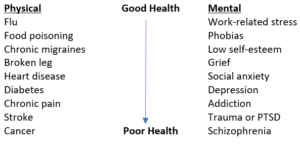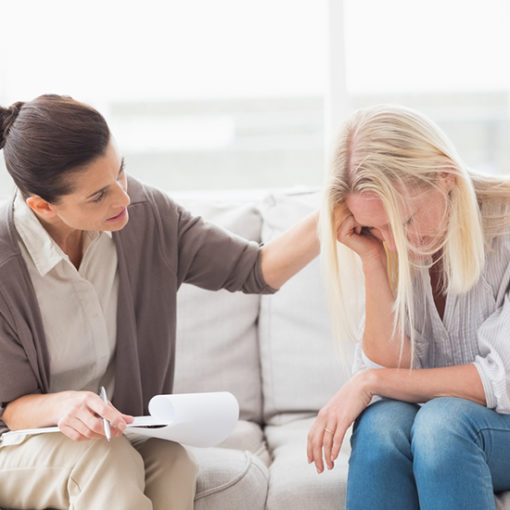The World Federation for Mental Health established World Mental Health Day on October 10, 1992 and has annually brought different topics to the public’s attention to increase awareness, understanding and to begin conversations about mental health. This is crucial because there is a lot of misinformation about mental health.
People frequently have the misconception that people in poor mental health have psychological disorders. In fact, mental health is like physical health where there is a spectrum upon which we all fall, with some people in great health and others in poor health. Our mental health can and does change depending upon circumstances. Below is an example of what this might look like.
Not everybody who is struggling with poor mental health has a diagnosable mental disorder. Somebody dealing with divorce, job loss, injury or illness, death of a child or the discovery that their partner has had an affair will likely be in poor mental health for a period of time. Anybody who has been abused, been in an accident or witnessed traumatic events might be in poor mental health. Even people who appear to be strong and functioning well can be struggling with mental health issues.
Mental health problems are not a sign of weakness. They can strike the strongest people and can be made worse by trying to remain strong without seeking help or support. Mental health issues affect everyone, just like physical health issues. That’s why it’s important to take care of our mental health in the same way that we care for our physical health.
Taking care of our mental health overlaps with physical health in many ways. Proper sleep, diet, exercise and a balanced lifestyle are all important. It’s also important to pay attention to your mood, behaviour and mental state and make adjustments when things are not going well, rather than ignoring issues. Like physical health issues, seek help when things are not right. If your knee is sore and making it hard to walk, you would see a doctor. If you’re distracted and unable to focus because your mind is too full of worries, then see a therapist or counsellor.
Perhaps people don’t seek help because it can be difficult to identify mental health issues. You know when your knee is sore, but you might not be aware that you’re being angry, impatient and aggressive with your family. You might believe you’re just reacting to the problems around you. For this reason, it’s important to let people know when there are changes in their mood or behaviour so they can have greater self-awareness and identify when things are not right.
What should you look for in yourself or others to indicate poor mental health? Here are a few common indicators:
- Frequent crying
- Distraction, lack of focus, excessive forgetfulness
- Anger and angry outbursts that are out of proportion to the situation
- Constant worry, overthinking, reviewing what you said and did and worrying about it
- Fear of doing things, seeing people and attending events
- Drinking too much, eating too much, sleeping too much or insomnia
- Lethargic, lacking motivation to do anything
- Feeling hopeless, helpless or worthless
- Self-harm, suicidal thoughts or thinking it would be easier not to be alive
- Perfectionism, constantly cleaning, checking and double-checking things
- School avoidance or frequent sick days
This list is not exhaustive, but it identifies some of the most common symptoms of poor mental health. With help, these symptoms and their underlying issues can be improved or resolved.
 When someone struggles with poor mental health, there are sources of support. First, speaking with friends and family and opening up can be helpful at times. Unfortunately, most people are not adequately equipped with the skills to psychologically support others. In these cases, speaking with a professional is helpful. Counsellors and psychologists are available almost everywhere in the world and online, so there is no reason to
When someone struggles with poor mental health, there are sources of support. First, speaking with friends and family and opening up can be helpful at times. Unfortunately, most people are not adequately equipped with the skills to psychologically support others. In these cases, speaking with a professional is helpful. Counsellors and psychologists are available almost everywhere in the world and online, so there is no reason to
Hopefully, knowledge of mental health issues will increase so that people are more aware of their own state of health and are more willing to engage in honest conversations about mental health without fear or embarrassment. Be a supporter of better mental health and do your part to engage in conversations, speak to other people when you are aware of an issue, and be willing to seek help when you believe your mental health could improve.
 6793total visits,6visits today
6793total visits,6visits today




